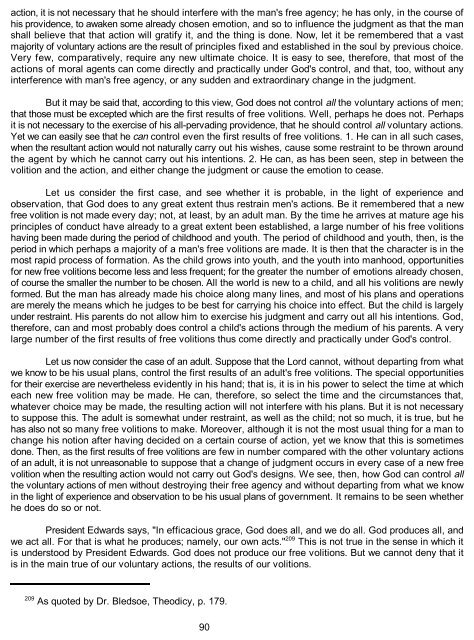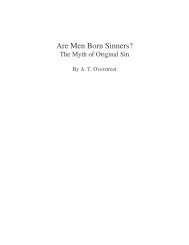Foreknowledge by Joel Hayes - Library of Theology
Foreknowledge by Joel Hayes - Library of Theology
Foreknowledge by Joel Hayes - Library of Theology
You also want an ePaper? Increase the reach of your titles
YUMPU automatically turns print PDFs into web optimized ePapers that Google loves.
action, it is not necessary that he should interfere with the man's free agency; he has only, in the course <strong>of</strong><br />
his providence, to awaken some already chosen emotion, and so to influence the judgment as that the man<br />
shall believe that that action will gratify it, and the thing is done. Now, let it be remembered that a vast<br />
majority <strong>of</strong> voluntary actions are the result <strong>of</strong> principles fixed and established in the soul <strong>by</strong> previous choice.<br />
Very few, comparatively, require any new ultimate choice. It is easy to see, therefore, that most <strong>of</strong> the<br />
actions <strong>of</strong> moral agents can come directly and practically under God's control, and that, too, without any<br />
interference with man's free agency, or any sudden and extraordinary change in the judgment.<br />
But it may be said that, according to this view, God does not control all the voluntary actions <strong>of</strong> men;<br />
that those must be excepted which are the first results <strong>of</strong> free volitions. Well, perhaps he does not. Perhaps<br />
it is not necessary to the exercise <strong>of</strong> his all-pervading providence, that he should control all voluntary actions.<br />
Yet we can easily see that he can control even the first results <strong>of</strong> free volitions. 1. He can in all such cases,<br />
when the resultant action would not naturally carry out his wishes, cause some restraint to be thrown around<br />
the agent <strong>by</strong> which he cannot carry out his intentions. 2. He can, as has been seen, step in between the<br />
volition and the action, and either change the judgment or cause the emotion to cease.<br />
Let us consider the first case, and see whether it is probable, in the light <strong>of</strong> experience and<br />
observation, that God does to any great extent thus restrain men's actions. Be it remembered that a new<br />
free volition is not made every day; not, at least, <strong>by</strong> an adult man. By the time he arrives at mature age his<br />
principles <strong>of</strong> conduct have already to a great extent been established, a large number <strong>of</strong> his free volitions<br />
having been made during the period <strong>of</strong> childhood and youth. The period <strong>of</strong> childhood and youth, then, is the<br />
period in which perhaps a majority <strong>of</strong> a man's free volitions are made. It is then that the character is in the<br />
most rapid process <strong>of</strong> formation. As the child grows into youth, and the youth into manhood, opportunities<br />
for new free volitions become less and less frequent; for the greater the number <strong>of</strong> emotions already chosen,<br />
<strong>of</strong> course the smaller the number to be chosen. All the world is new to a child, and all his volitions are newly<br />
formed. But the man has already made his choice along many lines, and most <strong>of</strong> his plans and operations<br />
are merely the means which he judges to be best for carrying his choice into effect. But the child is largely<br />
under restraint. His parents do not allow him to exercise his judgment and carry out all his intentions. God,<br />
therefore, can and most probably does control a child's actions through the medium <strong>of</strong> his parents. A very<br />
large number <strong>of</strong> the first results <strong>of</strong> free volitions thus come directly and practically under God's control.<br />
Let us now consider the case <strong>of</strong> an adult. Suppose that the Lord cannot, without departing from what<br />
we know to be his usual plans, control the first results <strong>of</strong> an adult's free volitions. The special opportunities<br />
for their exercise are nevertheless evidently in his hand; that is, it is in his power to select the time at which<br />
each new free volition may be made. He can, therefore, so select the time and the circumstances that,<br />
whatever choice may be made, the resulting action will not interfere with his plans. But it is not necessary<br />
to suppose this. The adult is somewhat under restraint, as well as the child; not so much, it is true, but he<br />
has also not so many free volitions to make. Moreover, although it is not the most usual thing for a man to<br />
change his notion after having decided on a certain course <strong>of</strong> action, yet we know that this is sometimes<br />
done. Then, as the first results <strong>of</strong> free volitions are few in number compared with the other voluntary actions<br />
<strong>of</strong> an adult, it is not unreasonable to suppose that a change <strong>of</strong> judgment occurs in every case <strong>of</strong> a new free<br />
volition when the resulting action would not carry out God's designs. We see, then, how God can control all<br />
the voluntary actions <strong>of</strong> men without destroying their free agency and without departing from what we know<br />
in the light <strong>of</strong> experience and observation to be his usual plans <strong>of</strong> government. It remains to be seen whether<br />
he does do so or not.<br />
President Edwards says, "In efficacious grace, God does all, and we do all. God produces all, and<br />
209<br />
we act all. For that is what he produces; namely, our own acts." This is not true in the sense in which it<br />
is understood <strong>by</strong> President Edwards. God does not produce our free volitions. But we cannot deny that it<br />
is in the main true <strong>of</strong> our voluntary actions, the results <strong>of</strong> our volitions.<br />
209<br />
As quoted <strong>by</strong> Dr. Bledsoe, Theodicy, p. 179.<br />
90






